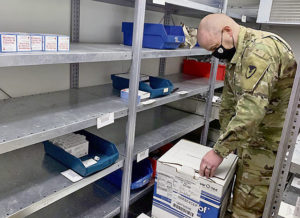
As the distribution of the COVID-19 vaccine continues globally, the U.S. Army Medical Materiel Center-Europe is playing a crucial role in getting vaccines to troops and beneficiaries throughout Europe, Africa and the Middle East.
USAMMC-E, a direct reporting unit to Army Medical Logistics Command, is the theater lead agent for medical materiel, also known as the TLAMM, for a large region of the world, covering U.S. European, African and Central commands.
In early January, Army teams procured specialized shipping containers and oversaw the safe transport of COVID-19 doses across the complex geographical region.
USAMMC-E’s leadership role in the wider distribution operation has ensured all three combatant commands it supports receives needed doses in order to maintain their readiness in the face of the global pandemic.
“This mission is unlike anything we have ever seen here at USAMMC-E,” said Brian Swiss, USAMMC-E’s chief of staff. “We have had to learn as we go and adjust fire often to ensure the vaccine arrives quickly and safely.”
Maj. Race Dulin, chief of USAMMC-E’s Pharmacy and Lab Division, said the new specialized transportation containers contain two different layers of insulation, along with another internal compartment with a top of the line “phase change” refrigerant.
The containers are certified to hold temperatures of minus-25 to minus-15 degrees Celsius for about 11 days, a vast improvement over previous cold-chain containers and an important step to preserve the vaccine that requires ultra-cold storage temperatures prior to administration.
“To put in perspective, each shipping container weighs 75 lbs. when empty,” Dulin said. “This was a game changer for USAMMC-E’s ability to support the mission.”
To date, first and second doses have been distributed to Turkey, four locations across U.S. Central Command and Portugal.
Dulin said the Defense Logistics Agency has overseen distribution to as many medical treatment facilities as possible across Europe, while USAMMC-E has been tasked with handling logistics to ensure doses go out to more difficult to reach locations.
“The customs portion can be especially time consuming as emergency-use authorization vaccines may not be clearly defined in a host nation’s Status of Forces Agreement,” he added. “This requires USAMMC-E to work closely with commercial carriers, the destination country’s customs office and [combatant command] representatives” to minimize the risk of transit issues that may jeopardize the doses.
Qatar and Kuwait, for example, both require approval from their ministries of health before allowing each individual shipment into those countries, Dulin said.
Led by Commander Col. Shane Roach, USAMMC-E worked closely with U.S. Central Command to help prepare doses for their onward distribution from the U.S. Army Medical Materiel Center-Southwest Asia and forward logistical elements to reach individual units.
Teams are reviewing cold-chain packing materials, as well as procuring and shipping additional supplies. They also made a training video to show how to properly pack both the previous frozen transportation containers and the new ones, Dulin said.
“Col. Roach and the rest of the command team couldn’t be more proud of the team’s efforts,” Swiss said. “Many long sleepless nights have and will continue to occur, but knowing our Soldiers on the front lines are safe from the virus makes it all worth it.”


